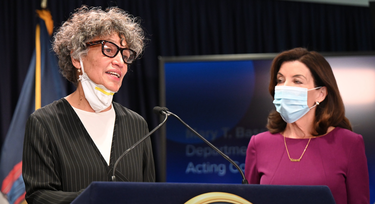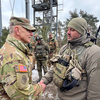With Omicron in U.S., county and state urge mask-wearing and vaccination
ALBANY COUNTY — “New Yorkers, get vaccinated, get boosted, and get ready,” said Governor Kathy Hochul at a press conference in New York City Thursday morning as she introduced the state’s new health commissioner and announced a second case of the COVID-19 Omicron variant has been reported in the United States.
Albany County’s executive, Daniel McCoy, on Thursday had advice similar to the governor and the state’s new health commissioner: “With news that the first Omicron variant has been identified in California,” he said, “it’s even more important now that everyone get vaccinated if they haven’t already and to get the booster dose if they have….
“And we also need everyone to wear masks indoors, whether they’ve gotten their shots or not, and to stay home if they’re feeling sick.”
The first Omicron case was reported on Wednesday, of a vaccinated Californian returning from South Africa on Nov. 22 with “mild symptoms that are improving,” according to the Centers for Disease Control and Prevention.
The second case, also with mild symptoms, Hochul said, was reported in Minnesota of a person who had attended an anime event from Nov. 18 to 22 in New York City’s Javits Center.
Everyone attending the New York City event was required to be vaccinated and a list of attendees is being traced, Hochul said.
Mary Bassett, the state’s new health commissioner, said the Omicron variant does seem to be highly contagious in South Africa, where it was first reported, but also seems to be a milder illness.
“Nobody’s really sure …,” she said. “We’re all waiting to learn more.”
“We’re not sounding the alarms,” said Hochul. “We’re not overreacting to this, but I want New Yorkers to have the confidence to know that we are ready to deal with this.”
Hochul, who was in Washington, D.C. on Tuesday for a congressional meeting, praised President Joe Biden for mounting “a national response to what is a national need and a global crisis.”
Biden on Thursday announced his winter plan for coping with COVID-19, including boosters for all adults, vaccinations for kids to keep schools open, and expanding free at-home testing,
The plan, detailed on the White House website, includes stronger protocols for international travel, workplace protections to keep the economy open, rapid response teams to battle rising cases, supplying pills to prevent hospitalizations and death, and continuing global vaccination efforts.
While Hochul contrasted Biden’s national response to that of Donald Trump’s, which, she said, “required there to be people in other states who took leadership positions,” Bassett contrasted Hochul’s approach to that of her predecessor, Andrew Cuomo.
A “cookie-cutter, top-down strategy,” Bassett said, loses trusting relationships and know-how of local health departments. “These partnerships matter to a coherent statewide strategy,” said Bassett.
Of undermining local health departments in the past, she said, “That time is over.”
Hochul herself described her response to COVID-19 as a “surgical approach.”
While some of her responses, like requiring health-care workers to be vaccinated, are statewide, she said others are targeted within statewide parameters.
Hochul has drawn a line for hospitals statewide to have capacity with staffed beds. Any hospital, such as Albany Medical Center’s, that has 10 percent or fewer staffed beds will, as of Friday, Dec. 3, have to cease elective procedures.
The vast majority of those 50 or so hospitals that lack capacity are upstate, Hochul said, corresponding with lower vaccination rates.
“We don’t need one-size-fits-all,” said Hochul, pointing out the difference between New York City with an infection rate of 1 percent and some upstate areas with infection rates of 10 percent or higher — as in the Finger Lakes and Western New York.
Hochul also said she would not engage in a strategy ignoring local health departments and spoke of the value of involving local people on the ground.
Dr. Bassett
“I’m no stranger to crisis,” said Bassett, introducing herself. “When I just finished my medical training, I moved to Southern Africa where the world’s worst HIV/AIDS epidemic was unfolding.”
She served on the medical faculty at the University of Zimbabwe for 17 years, during which time she developed a range of AIDS prevention interventions. Bassett went on to serve as associate director of health equity at the Rockefeller Foundation’s Southern Africa Office, overseeing its Africa AIDS portfolio.
Bassett, who grew up in New York City, received a bachelor’s degree in history and science from Harvard, a medical degree from Columbia, and a master’s degree in public health from the University of Washington.
“Some years later,” Bassett went on, “as the New York City health commissioner, I encountered more microbes than I ever would have predicted. There was Ebola, there was Legionnaires, there was Zika. In three decades of public-health work, I’ve learned the impact of truth-telling.”
From 2014 through summer 2018, Bassett served as commissioner of the New York City Department of Health and Mental Hygiene, where she made racial justice a priority and worked to address the structural racism at the root of the city’s persistent gaps in health between white New Yorkers and communities of color.
“If we needed any more evidence that public health is also rooted in social justice, COVID also gave us that,” Bassett said at Thursday morning’s press conference. “COVID literally pulled back the curtain on enduring and unaddressed inequities ….
“This virus found its way through our failures. Failure to ensure the right to health-care services, failure to assure available and high-quality primary care in tackling obesity and other chronic conditions. COVID accelerated what’s become a relentless tide of overdose deaths. And in our nation, all of these track along the problem of racism.”
Among Americans in prime working-age years, Bassett said, “nearly 90 percent of deaths among people of color would not have occurred if we had death rates that are equivalent to that of white college-educated individuals.”
Bassett concluded that it may seem that the coronavirus opened a Pandora’s box. “I hope all of you remember that there was something left in that box — and that was hope,” she said.
Bassett ended with a reminder of the “small steps that each of us can also take that will make a big difference … get vaccinated … get boosted. Wear a mask. If you feel sick, stay home …. We are all in this together.”
Booster shots
Hochul stressed the importance of vaccination, booster shots, and testing for the virus.
Booster shots are needed because the vaccine loses its effectiveness over time.
There is also some question as to whether current vaccines will be effective against the Omicron variant.
All three drug companies with vaccines authorized in the United States are running tests to see if their vaccinations work against Omicron.
Hochul said she had talked to the chief executive officer of Pfizer who said it would take 90 to 100 days if the company had to develop a vaccine for a new variant.
Hochul also talked to the Pfizer CEO about medicine it’s developing that, when widely available, will allow Covid-19 patients to be treated at home, she said.
On Tuesday, a Food and Drug Administration advisory committee voted, 13 to 10, to recommend emergency authorization for pills made by Merck for use by COVID patients at risk of severe infections. Pfizer’s antiviral pill is expected to be reviewed by the FDA soon.
Any adult who has had two shots of Moderna or Pfizer-BioNTech vaccine is eligible for a booster shot six months after the second shot. Any adult who was vaccinated with the single-shot Johnson & Johnson vaccine, is eligible for a booster shot after two months.
Hochul reported on Thursday that only 16 percent of adult New Yorkers have gotten booster shots. Of New Yorkers age 65 and older, 37 percent have received booster shots, she said.
Hochul also stressed the importance of getting a second shot of the Moderna and Pfizer vaccines. She said the state sent out over 600,000 text messages to people who received one dose but not two. “The one dose does not do the job,” she said.
The state is increasing its pop-up sites and also offering incentives for people to get vaccinated. These incentives include drawings for kids that pay for a college education at a state school, lifetime hunting and fishing passes, and most recently free ski passes for kids at state ski areas.
Hochul also announced a “Boost Up New York” campaign, urging people to get booster shots before gathering for the holidays.
Also, Hochul said, the state has ordered another million antigen tests, allowing the department of health to prioritize getting them to students.
They may be used, she said, “for kids to return if they had to go home because someone in their classroom tested positive.”
Hochul said the state has been pushing to have private insurance companies pay for people to get over-the-counter tests. “We just received word from the White House that they will require that insurance companies now cover the cost of over-the-counter tests to make sure that they’re more widely available and that there’s no barriers to access to those as well,” she said.
Hochul, concluding her remarks on Thursday, answering reporters’ questions, said “I’m not prepared to shut down schools or the economy now … That would be an overreaction.”
She said she had “prepared all the scenarios necessary” and “can deploy them with just a word … I will not overreact and send this economy spiraling out of control.”
Albany County
Three more county residents have died of COVID-19, McCoy announced in his daily release on the virus Thursday morning.
The latest victims are a woman in her fifties, another woman in her eighties, and a man also in his eighties. Their deaths bring the county’s toll to 449.
McCoy also reported 202 new COVID-19 cases, bringing the county’s five-day average of daily cases up to 146.2.
Albany County’s most recent seven-day average of percent positive rate is 6.2 percent and the Capital Region’s average rate is 7.9 percent.
There are now 627 active cases in Albany County, up from 588 on Wednesday. The number of county residents under quarantine jumped to 1,055 from 905.
There were five new hospitalizations since Wednesday, and there are now a total of 53 county residents hospitalized with the coronavirus — a net decrease of eight. Six of those hospital patients are now in intensive-care units, down from eight on Wednesday.
“Today marks the second consecutive day that new daily COVID infections have topped 200 in Albany County ….,” said McCoy in the release. “I’m proud to say the county was able to provide 110 vaccine doses at our walk-in clinic at the health department yesterday.”
As of Monday, 75.5 percent of all Albany County residents have received at least the first dose of the vaccine, and 67.7 percent have been fully vaccinated. The first-dose vaccination rate for county residents 18 and older is 84.8 percent.
Statewide, 78.4 percent of New Yorkers have received at least one dose as have 91.0 percent of New Yorkers 18 and older. At the same time, 68.6 of all New Yorkers are fully vaccinated as are 80.8 percent of New Yorkers 18 and older.



